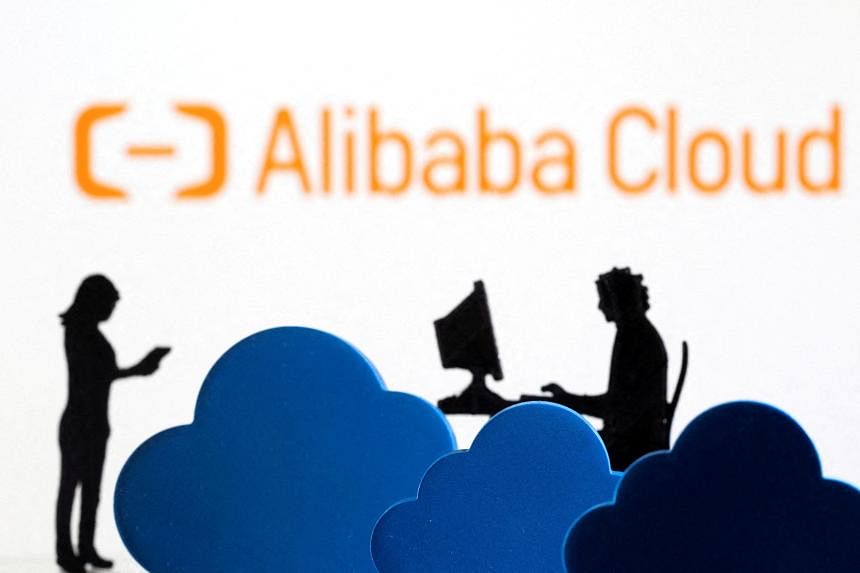HONG KONG – An escalating fight between the United States and China for technological dominance has triggered one of the most stunning reversals of corporate strategy yet: On Nov 16, Alibaba Group Holding walked back plans to spin off and list its US$11 billion (S$14.8 billion) cloud business.
Chief executive Eddie Wu explained in his first public remarks since taking the helm that the United States’ ever-increasing restrictions on chip sales to China have forced the company to rethink its plan to break up into six parts the empire Mr Jack Ma spent decades amassing.
Alibaba also said it is suspending a listing for the popular grocery business Freshippo.
The stock market’s response to Alibaba’s reversal was brutal: Its shares slid 8 per cent in Hong Kong on Nov 17. Overnight in New York, the stock plunged 9.1 per cent, wiping out more than US$20 billion of market value in their biggest drop in more than a year.
The decision comes at a difficult time for Alibaba. The company is trying to stage a comeback from the Covid-19 pandemic. It is also only just emerging from a tech industry-wide crackdown in China. And it is working to win back merchants and shoppers who have flocked to PDD Holdings’ shopping app Temu and newer entrants such as ByteDance’s Douyin, as well as corporate customers that have turned to state-backed cloud services.
The Biden administration’s curbs on exports of certain chips – specifically designed for artificial intelligence use and critical for the data centres and high-end computing operations that drive Alibaba’s cloud services – are not helping.
“Circumstances have changed,” Alibaba chairman Joseph Tsai told analysts on a post-earnings call. The company must now focus on providing “cash to make investments – because in the AI-driven world, to develop a full-blown business based on a very networked and highly scaled infrastructure, it requires investment”.
The Chinese e-commerce leader is joining social media giant Tencent Holdings in publicly raising the challenges that the US’ trade restrictions have brought about. The Biden administration’s efforts to prevent the Chinese government from obtaining cutting-edge chips for military applications have begun affecting the country’s private sector in unexpected ways.
Analysts said other factors might have played into Alibaba’s reversal. Its cloud business has been slowing and losing market share for years – and has attracted government scrutiny over alleged security violations.
The best time for Alibaba to have sought a public listing for its cloud division “has already passed”, said Mr Li Chengdong, head of the Beijing-based technology think-tank Haitun. “The strength of the business itself is an issue.”
Even before Nov 16’s announcement, Alibaba’s endeavour had faced headwinds.
Its potential Hong Kong initial public offering (IPO) of Freshippo was on the back burner amid weak sentiment for consumer stocks.
Former CEO Daniel Zhang quit just months after agreeing to lead its cloud division. Logistics arm Cainiao filed for a Hong Kong IPO in late September, but the valuation it will command remains unclear.
Still, Nov 16’s news came as a shock to almost everyone on Wall Street.
“I was quite taken aback,” said Mr Kevin Net, head of Asian equities at Tocqueville Finance. “My initial thoughts are that the whole corporate restructuring announced in May could be at risk.”
Instead of a split-up, Alibaba executives said, the company will focus on growing the cloud unit organically and issuing its first-ever annual dividend, totalling US$2.5 billion, a bid to assuage shareholders who were hoping for a big payout from the unit’s debut.
“The market is scratching its head,” said Forsyth Barr Asia research analyst Willer Chen. “The first annual dividend looks like a compensation to shareholders. However, it may not fully offset the shock given the higher value of (the) cloud unit.”
Alibaba announced its decisions along with solid but unspectacular quarterly earnings.
It posted an 8.5 per cent rise in sales to 224.79 billion yuan (S$42.3 billion), barely exceeding average projections, and swung to a profit of 27.7 billion yuan from a year-ago loss. BLOOMBERG

